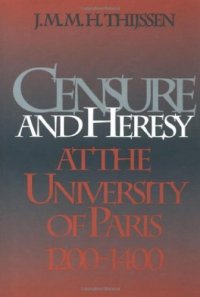
Ebook: Censure and Heresy at the University of Paris, 1200-1400
Author: J. M. M. H. Thijssen
- Tags: Church History, Churches & Church Leadership, History, Biblical History & Culture, Church History, Historical Theology, France, Europe, History, Christianity, Religious, World, History, Religion & Spirituality, Agnosticism, Atheism, Buddhism, Hinduism, Islam, Judaism, Literature & Fiction, New Age & Spirituality, Occult & Paranormal, Other Eastern Religions & Sacred Texts, Other Religions Practices & Sacred Texts, Religious Art, Religious Studies, Worship & Devotion, Medieval Thought, Philosophy, Politics & Social Sciences
- Series: The Middle Ages Series
- Year: 1998
- Publisher: University of Pennsylvania Press
- Edition: 0
- Language: English
- pdf
For the scholastic philosopher William Ockham (c. 1285-1347), there are three kinds of heresy. The first, and most unmistakable, is an outright denial of the truths of faith. Another is so obvious that a very simple person, even if illiterate, can see how it contradicts Divine Scripture. The third kind of heresy is less clear cut. It is perceptible only after long deliberation and only to individuals who are learned, and well versed in Scripture.
It is this third variety of heresy that J.M.M.H. Thijssen addresses in Censure and Heresy at the University of Paris, 1200-1400. The book documents 30 cases in which university trained scholars were condemned for disseminating allegedly erroneous opinions in their teaching or writing, and focuses particularly on four academic censures that have occupied prominent positions in the historiography of medieval philosophy.
Thijssen grants central importance to a number of questions so far neglected by historians regarding judicial procedures, the authorities supervising the orthodoxy of teaching, and the effects of condemnations on the careers of the accused. He also places still current questions regarding academic freedom and the nature of doctrinal authority into their medieval contexts.